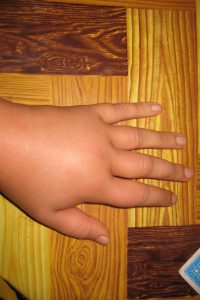Again, my first advice is to get in touch with people that have already been to your field site, and know the situation there – is there a hospital around? What have been the threats concerning health situation during their field trips? Have they been ill? What are you supposed to do if you/someone else gets ill? Is there a doctor to contact? With your health at risk, that´s definitely not the time to be shy and concerned about getting on someones nerves!
Medical care
Before you go out to the field, especially under very basic conditions, you have to be aware that there might be no proper medical treatment available. The medical care situation might vary a lot depending on your field site, but your health is always the first thing you should have on your mind. So, be sure you know what the situation is before you are at the field station. Get informed about EVERY POSSIBLE illness that might occur at your field site. Make sure that you can identify the symptoms of each illness and take the right treatment with you – be aware that the instructions often do not tell you the right dose (that´s personal experience, be better prepared than me!), so make sure you are informed about that beforehand, too. You have to take that very seriously, your life/ the life of your companions might depend on it. For example, I had malaria in my first field season and luckily was able to identify it myself and treat it immediately.

Always bring anti-histamines to treat allergic reactions, best even some doses of hydrocortisone injects, even if you might not be aware of you being allergic to something. During my time in Madagascar, I developed a strong allergy to stings of a local wasp species after having being stung by several individuals during my first field season and reacted heavily to their stings ever since – causing heavily swollen body parts and fever. No fun! Even more dangerous was a situation where one of my field assistants had an allergic reaction after eating sea food, and we just got him to the nearest medical station (without a doctor present, but at least they had hydrocortisone) before he was not able to breathe at all. It took us a day to reach that hospital, and he might not have survived if I hadn´t had antihistamines with me to treat him. That was really scary, and I brought doses of hydrocortisone injections to the field ever since!
In case you are/ someone is ill, it will be your decision what to do. Can you identify what it is? Do you need to leave the field station? Do you know where to go? Where is the closest hospital? Do you know whom to contact?
Make sure a situation before that is (theoretically) handled before you are in it. This means before you are out in the field. Have a list of telephone numbers available for everyone to contact. Also, make sure that everyone knows what to do if you are not fit enough to lead the situation.
Hygiene articles

Also, very important for women that might be menstruating during the field trip: Don´t be ashamed to ask what the situation looks like in the country you are in! Will you be able to buy the supplies you need there, or will you need to bring all of the tampons/sanitary napkins/whatever you use for that duration with you? Especially if you are about to spend several months in remote areas, it might be worth to think about using a Moon Cup – actually something that is worth thinking about in everyday conditions, too! No waste here, and ones you are used to wearing it, it is way more comfortable than other supplies.
Company
Do not underestimate the importance of a good companion in the field, especially under very basic conditions. Will there be other researchers at your field site? How many people will be at the camp? E.g. in Madagascar, every researcher works together with a Malagasy counterpart student, which is extremely useful for both. The Malagasy student profits from the experience and knowledge you share with her/him, and the foreign researcher especially profits from the extra help with research and translating, and of course information on cultural background. If you have the possibility, you should have another assistant or researcher with you during your fieldwork. Be sure that you take good care of each other, and that everyone knows whom to contact in case of a problem – e.g. your supervisors or the project coordinator. Take health issues seriously, and care for each other if someone is sick. Be aware that for the time in the field, your assistant/ other researcher/ student will be the person closest to you, so keep up a good relationship for the time you are there!
Physical healthcare
Make sure that you take good care of your health – eat and sleep enough, and observe your health (and that of others). It is better to take small stuff too serious than to overlook something really bad. Especially when we (scientists) are out in the field to collect data, we tend to forget that collecting tons of data is not everything. If you are exhausted because you collect data all day and night and are stressed, it´s more likely that you catch an illness, and in the field, that´s even more dangerous than it is at home.
Please, don´t do stupid stuff
This is the field. Not a good place to test if you can catch that venomous snake by hand, jump across that 2-meter gap in the ground, climb that tree, or if it´s safe to continue observations in the forest during heavy storms. Just don´t. Also, take care that the people that are with you don´t take unnecessary risks. You think that´s self-evident? Believe me, it´s not! I´ve seen several injuries during my time in the field that would have been avoidable. This can be extremely dangerous in the field, especially if you don´t have proper health care available.
Mental healthcare

Be kind to yourself and treat yourself and the people around you. Sometimes it just needs someone to tell you that it is okay to not work all the time. Definitely have a “treat day” at least once per week, where you don´t work and have special food, and do whatever relaxes you. Have chocolate or other “unnecessary” treats. Have fun with your team. Bring a nice smelling shampoo/body lotion/perfume/whatever makes you feel really good. In my first time in the field, I considered that stupid and unnecessary – until I discovered that someone left a coconut body lotion behind, which I started to use every Sunday after an extended bath in our river. It was the definition of heaven on earth. I still can smell it. I´m hooked up on coconut body lotion ever since! Little things can lighten up your mood so much, don´t underestimate that!
Last but not least: Have a fantastic time in the field!
Learn about what to think about regarding your field site here!





